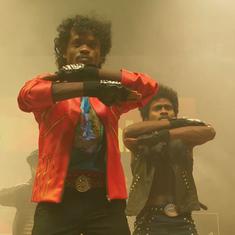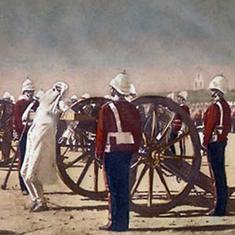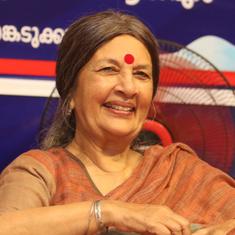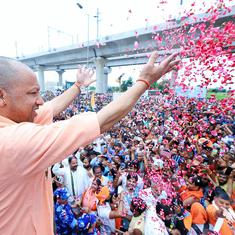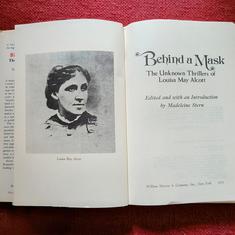On January 24, when Sudhir Dhawale walked back into the narrow lane in the Mumbai neighbourhood of Govandi where he lived until he was arrested in June, 2018, young men welcomed him with the beat of the dhol.
His neighbours then marched in a celebratory procession to a statue of BR Ambedkar 100 metres away. Dhawale garlanded the statue and gave a short speech about the importance of safeguarding Dalit rights. And just like that, he said, his life returned to normal.
That day, activist and writer Dhawale, aged 56, and researcher Rona Wilson had been released on bail from Taloja prison in nearby Navi Mumbai, six years and seven months after the police arrested them on charges of inciting caste violence in Bhima Koregaon village near Pune on January 1, 2018. One person died in the clashes.
Sixteen academicians, writers, activists and lawyers were arrested in the case. Nine of them have received bail so far.
Dhawale said the prison gave him time to write. He authored five books while in jail. Two of them have already been published.
After the death of 84-year-old Jesuit priest father Stan Swamy in July 2021, who was a co-accused in the case, Dhawale also turned to poetry.
Sitting in his office in Govandi a few days after his release, he read one of his couplets from a notebook.
“Pehle kanoon andha tha, ab ankhein khol kar bhi andha hai.” Earlier law was blind, it continues to remain blind even with the blindfold gone.
It was a reference to a new statue unveiled in the Supreme Court last year, featuring Lady Justice without a blindfold, with her eyes open.
Dhawale is the publisher of Marathi magazine Vidrohi and the founder of the Republican Panthers Jatiantachi Chalwal, an organisation that works for Dalit rights. He was amongst the organisers of Elgaar Parishad, an event held to commemorate the 200th anniversary of the battle of Bhima Koregaon. The police claimed speeches made during the event incited violence the next day.
Dhawale disagrees.
Tomb desecration
Dhawale says the violence was triggered by events in a village called Vadhu Budruk, 3 km from Bhima Koregaon. Two days before the Elgaar Parishad, the tomb of Govind Gaikwad, a Dalit who is believed to have conducted final rites of the 17th-century ruler Sambhaji, was desecrated in Vadhu Budruk.
Dalits had filed a complaint about this, naming 49 people.
Dhawale said that he and several of the organisers of the Elgaar Parishad demanded a judicial investigation into the clashes. “Right-wing groups, incited by Milind Ekbote and Sambhaji Bhide, charged at the people walking towards Bhima Koregaon,” Dhawale alleged.
Ekbote is the president of an organisation called the Samasta Hindu Aghadi, while Bhide is the founder of Shiv Pratishthan Hindustan.
Dhawale said that the Elgaar Parishad was organised with police permission and was conducted smoothly with police personnel attending the event. In the meeting, he called for an end to Peshwa-style rule. The Peshwa regime in Maharashtra in the 17th and 18th centuries were noted for its persecution of Dalits.
Dhawale said that his reference to Peshwa rule was directed towards Hindutva leaders who sought to oppress Dalits and were allegedly involved in desecrating Gaikwad’s tomb.
“The event has no link with what happened the next day,” Dhawale said. “There were no speeches that provoked violence – politicians in our country make even more provocative statements.”
Dhawale and others made a representation to Devendra Fadnavis, the chief minister at the time, asking for Bhide and Ekbote’s arrest. “Instead the state arrested us,” he said.
He said that many of the people arrested in the case had no connection to the Elgaar Parishad.
“It was a clear set-up the government had planned well in advance,” he said.
On the day he was arrested, he got an inkling that he would be in jail for a long while when he realised that he had been charged under the draconian Unlawful Activities (Prevention) Act.
Activists Rona Wilson And Sudhir Dhawale walk out of Taloja jail after 6 years and 7 months of unjust incarceration.
— Safoora Zargar (@SafooraZargar) January 24, 2025
2424 days of denial of justice. pic.twitter.com/qQYQaQpnj9
UAPA charges
Dhawale had been arrested under UAPA once before, in 2011, on charges that he had links with Maoists. He was acquitted of all charges after spending 40 months in prison. He says that at that time, just like this time, the police did not have any evidence against him.
“But under UAPA, you can’t expect easy bail,” he said. “The Congress brought this law and the BJP is making full use of it.”
In 2011, the police had seized his electronic devices and phone without giving him their hash values – the unique numeric code that identifies how much data they contained. This time too, Dhawale claimed, his devices were seized without giving him hash values.
Yet, despite these similarities, there is a stark contrast between his two arrests.
“In 2011, the police went about collecting evidence to show Naxal links after my arrest,” he said. “This time it seems they had begun to plant evidence much before our arrest. It was a set-up.”
However, even though Dhawale’s bail pleas were dismissed several times, he did not lose hope.
“We continued our fight even inside the prison,” he said.
Fought for Prison rights
For one-and-a half year in Pune’s Yerwada prison and three years in Taloja prison, he was kept in the notorious egg-shaped high security “anda cell” with no cell mates. But in his time in the common barracks, Dhawale said he tried to fight for prisoners’ rights.
Dhawale and others accused in the Bhima Koregaon case staged several protests. In 2020, they went on a hunger strike in support of the farm protests in North India. Last year, they held a two-day hunger strike to demand that they be produced in court. They also protested several times against the high prices of food in the prison canteen and corrupt practices there.
Dhawale is now in process of filing a writ petition in the Bombay High Court about the shortage of guards in jail, which is an excuse wardens offer for failing to transport prisoners to court.
There were also everyday humiliations. “In Taloja prison the superintendent expected prisoners to remove their footwear when they met him during his rounds,” Dhawale said. “I refused and protested against it. Casteism was rampantly practiced there.”
Dhawale was transferred to the anda cell after this episode.
Sagar Gorkhe, a member of Kabir Kala Manch cultural troupe who is also accused in the Bhima Koregaon case, was shifted to the anda-cell after he protested against being forced to take off his footwear in the presence of the superintendent.
“Oppression of Dalits and Muslim is openly practiced in prisons,” Dhawale said. Dalits, he said, are made to clean the prison gutters. The Supreme Court’s verdict in October 2024 banning the caste-based work allocation has had no impact on the jail practices, Dhawale said.
Inadequate health facilities
Dhawale claimed that at least three inmates have died in Taloja prison in the last four months. “Delay in treatment is the biggest problem,” he said. “Many don’t even reach the hospital for treatment. They die in jail.”
When the Covid-19 pandemic broke in 2020, prisons in the initial months had no kits to test inmates. “Many had fever in the barracks,” Dhawale said. “I had too. The prison staff gave us paracetamol. That’s it.”
While each prisoner is entitled to 145 litres of water per day according to jail manuals, Dhawale said they would receive 16 litres to 20 litres and were forced to pay for water.
The idea of a prison is to deflate all hope, he said. “If the government is able to arrest senior politicians, we don’t really matter,” he said. “These arrests make one thing clear: dissent will not be tolerated.”
Dhawale said the Bhima Koregaon arrests are an example of how the state can conspire against its own citizens and plant evidence to implicate them. “Our arrest was the beginning,” he said. “This will continue for them to remain in power.”

